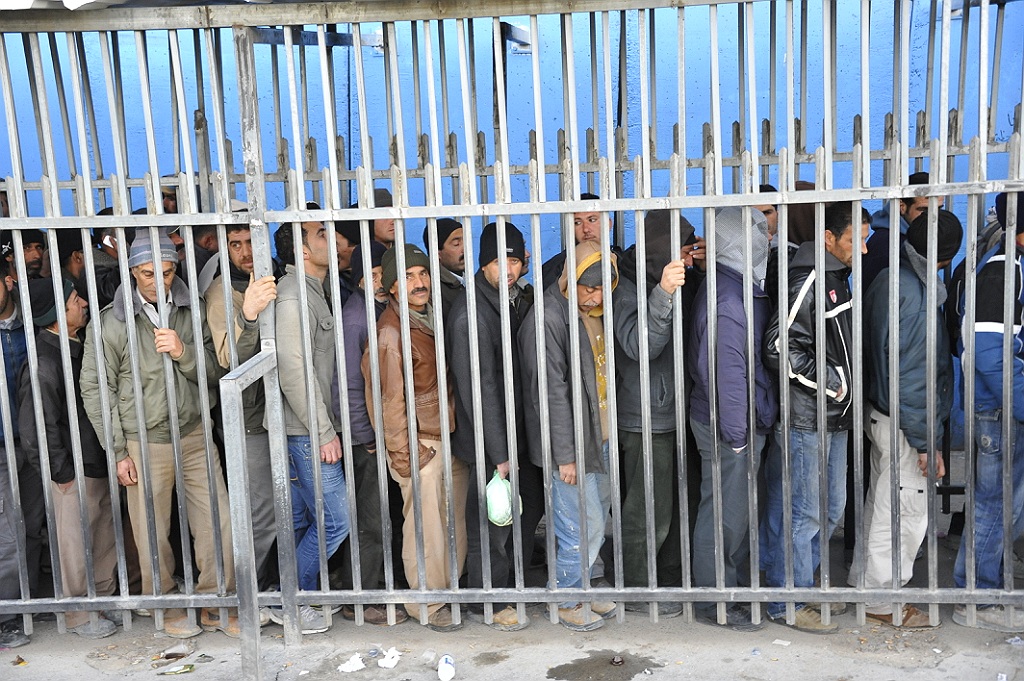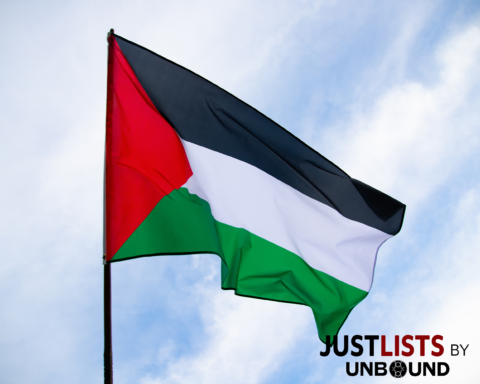 From behind a large concrete security wall,
From behind a large concrete security wall,
Palestinians are saying, “Do not invest in our prison,” and at the end of this month, Presbyterians will have an opportunity to listen.
On June 30, 2012, the Presbyterian Church (U.S.A.) begins its 220th General Assembly. There, elected commissioners will vote on ten overtures and recommendations for peace in Israel and Palestine; seven propose or denounce specific measures to divest from corporations (Caterpillar, Hewlett-Packard, and Motorola Solutions) that “profit from non-peaceful activities in Israel-Palestine.”
The Mission Responsibility Through Investment Committee (MRTI) of the PC(USA) has spent over six years pursuing corporate engagement, dialogue, and other so-called “positive” strategies to encourage these companies to cease providing support, technology, and military equipment that sustain the occupation of Palestine—to no avail. (For a full historical background, see the MRTI Report.)
In 2009, for instance, Caterpillar management and a majority of investors rejected a shareholder proposal to stop selling bulldozers to Israel—a proposal brought forward by an interfaith coalition of human rights activists and Christian and Jewish investors partnering with the PC(USA).[1] Caterpillar CEO, Jim Owens, said simply, “If you don’t like how CAT does business, you don’t have to hold your shares.”[2]
Presbyterians are now looking to take Mr. Owens up on that offer.
Because, it is no mystery how CAT does its business. The “occupation” is a term for the entire military and economic enterprise of taking land slated to become a Palestinian state, restricting the Arab population to smaller and smaller areas by an extensive wall, and a network of surveillance and checkpoint installations. Armored Caterpillar bulldozers, deemed by an Israeli military commander to be “the key weapon” in the occupation,[3] have been key in home demolitions, in destroying parts of Gaza, and in constructing the security or separation wall. Hewlett Packard biometric security equipment and Motorola Solutions surveillance and motion-detection equipment form an integral part of the military occupation. Consequently, these firms and their products are not engaged in peaceful purposes.
The basic argument for divestment is that words-only approaches have simply failed to halt the growth of Israeli settlements and the intensification of the occupation by the separation wall and other means, virtually ending the prospect of a two-state solution and hastening the exodus of Christians from Palestine.[4]

The Three Pillars of Divestment: Integrity, Effectiveness, and Solidarity
Christians have been thinking about the ethics and strategy of investment for a long time. Through a set of Military-Related Investment Guidelines (1982), the church restricted its investments in nuclear warhead makers and the largest military contractors, whose securities continue to be proscribed for church investment agencies. The 1984 study The Divestment Strategy: Ethical and Institutional Context focuses on the two values of effectiveness and integrity, analyzed in light of trusteeship and Christian mission.
These values led to a range of strategic criteria that guided the church in the “selective, phased divestment” of securities in thirteen companies as part of the larger campaign against apartheid in South Africa. In broad strokes, then, there were three key values (integrity, effectiveness, and solidarity) undergirding considerations such as impact on those suffering, urgency, technical feasibility, coordination with partners, limitation of other strategies, and clarity of message.
In terms of effectiveness, historically, church-supported nonviolent economic pressure of all kinds, including divestment, contributed to the eventual departure of 214 of the 324 U.S. corporations operating in South Africa in 1981, representing an equity decline from $2.6 billion to $714 million, a substantial move toward isolating South Africa economically. As is well known, after the 1994 end of apartheid, figures such as Nelson Mandela, Desmond Tutu, and Allan Boesak credited the churches with decisive impact, as did studies such as Robert K. Massie’s Loosing the Bonds: The United States and South Africa in the Apartheid Years (Doubleday, 1998).
The nature of Christian mission in the Middle East involves the church in acts of solidarity with the remaining Christians, and with all who seek a peace with justice. An unprecedented ecumenical group issued the Kairos Palestine affirmation in December of 2009. Divestment is among their endorsed nonviolent methods of resistance to the occupation (Kairos Palestine Document: A Moment of Truth: A Word of Faith, Hope, and Love from the Heart of Palestinian Suffering). The position of the Kairos church leaders seems to articulate a broad desire among Palestinians for nonviolent resistance.
As a strategy, then, the divestment of securities in three key corporations would strengthen the integrity of the church’s moral opposition to the occupation, focus attention effectively on the means by which the occupation is profitably maintained, and be a clear sign of support for the Palestinian Christians and others seeking peace with justice. It would also be an action consistent with international law and a witness against the political failures that enable an oppressive situation to continue.

Can Divestment Contribute to the Peace Process?
Since the assassination of Prime Minister Yitzak Rabin by a fundamentalist Jew in 1995, the Oslo peace process has never recovered. The Second Intifada included suicide bombings and severe punitive raids on Palestinians, acts of terrorism fueled by increasing Islamist and Jewish fundamentalism. Settlement growth continued through the 1990s and 2000s, despite purported suspensions and the removal of 7,500 settlers from Gaza in 2005. Rockets by radical groups—a terrifying, if largely inaccurate, threat—were a cause or pretext for a one-sided war on Gaza.
The failure of the second Camp David process in 2000, though blamed largely on Yasser Arafat by Israeli and U.S. sources, reflected a substantial Palestinian willingness to concede land colonized by the major settlement cities, but an unwillingness to give up on a coherent Palestinian state with some shared sovereignty in Jerusalem. With the separation wall extensions, continued annexations and removals in East Jerusalem and Area C (60 percent) of the West Bank, strangulation of Palestinian land such as at the Tent of Nations, and violent responses to peaceful Palestinian protests, little hope is seen for a renewed peace process.
Public policy advocacy by the churches and human rights groups has been massively outgunned by well-funded groups dedicated to the defense of all Israeli interests, despite the emergence of more critical groups in the U.S. Jewish community. Diplomatically, although the U.S. calls for renewed negotiations, it has blocked international efforts to allow Palestine membership in the United Nations and vetoed efforts to hold Israel accountable to international law more than thirty times, while continuing more than $3 billion in military aid every year.
General Assemblies of the Presbyterian Church (U.S.A.) and many others of good will have called repeatedly for an effective end of the occupation since 1974, only to see both nonviolent and violent liberation efforts of the Palestinians suppressed. While interfaith dialogue has had some value during this time, the U.S. political and media context allows relatively little debate over the nature of the occupation of Palestine, much less opposition to its continued support. Similarly, the exodus of Christians from the occupied territories, including East Jerusalem, will continue unless voices coupled with action are raised challenging the conditions that are designed to push Arabs out of desirable areas.
For the Presbyterian Church (U.S.A.) to back its moral concerns with divestment would be a dramatic act of conscience and leadership. Although the 2009 Presbyterian Panel survey data indicate that a majority of Presbyterians support divestment for human rights reasons, considerable pressure will be applied and allegations of anti-Semitism would be expected, encouraging conflict in the church. Thus commissioners have to determine how important it is to act on a clear matter of justice in the face of open opposition.
From behind the wall, Palestinians wait for our answer.
Presbyterians: Sign this petition in support of divestment.
See other Unbound articles on Palestine and the movement for divestment.
Check out Ecclesio, conversations on the current scene through a Gospel lens.
Notes
[1] Let it be noted that resolutions opposed by management usually fail and that this shareholder proposal got a relatively high level of shareholder support.
[3] Alon Ben David, ‘Israel – Double Jeopardy’, Jane’s Defence Weekly, 17/11/04.
[4] An April 22, 2012, report by 60 Minutes confirms that Christians view the occupation as the primary impetus to their departure.
*The Advisory Committee on Social Witness Policy of the Presbyterian Church (U.S.A.) is responsible for providing advice and counsel to the General Assembly and its representative committees on overtures, commissioner resolutions, reports, and actions before the General Assembly that recommend policy direction or action on social witness. ACSWP is also responsible for identifying facets of the church‘s social witness that enable or obstruct effective action and making recommendations for improving social witness. ACSWP has reviewed the business coming to the 220th General Assembly (2012) and provided advice and counsel on several of the items. The articles that follow are summations of that advice. A&Cs, therefore, are not policy, though they generally refer to, and recommend further, GA action. As adaptations, these articles are another step removed, and we would refer those interested to the A&C’s themselves (available at www.pc-biz.org, under Committees, number 15, posted under Comment following the business Items they address). Banner photo by Sue Dravis.





Unbound Social